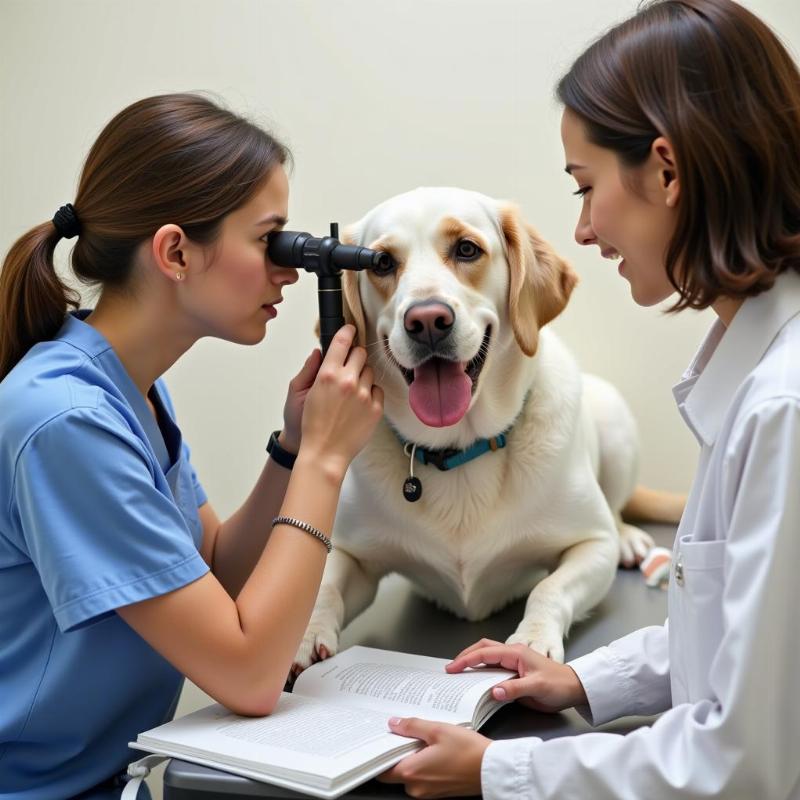Dealing with a dog eye ulcer can be a stressful experience for any pet owner. Understanding the role of medications like ofloxacin in treating this condition is crucial. This guide provides comprehensive information about ofloxacin for dog eye ulcers, covering everything from causes and symptoms to treatment options and preventative measures. We’ll discuss the importance of veterinary diagnosis and address common concerns related to using ofloxacin in dogs.
Understanding Dog Eye Ulcers
An eye ulcer, also known as a corneal ulcer, is a painful open sore on the cornea, the clear front surface of the eye. Recognizing the signs is crucial for prompt treatment. Symptoms include excessive tearing, squinting, redness, cloudiness, and pawing at the eye. Several factors can contribute to ulcer development, including injuries, infections, dry eye, and certain breeds being predisposed.
Ofloxacin: An Effective Treatment Option
Ofloxacin is a broad-spectrum antibiotic belonging to the fluoroquinolone class. It’s effective against a wide range of bacteria commonly associated with eye infections. It works by inhibiting bacterial DNA replication, thus preventing the infection from spreading and promoting healing. Ofloxacin is often prescribed as eye drops or ointment. Your veterinarian will determine the appropriate dosage and frequency based on your dog’s specific condition.
When to Seek Veterinary Care
It’s important to consult your veterinarian if you suspect your dog has an eye ulcer. Never attempt to self-treat your dog’s eye condition. A proper diagnosis is essential to determine the underlying cause and ensure appropriate treatment. Your veterinarian will conduct a thorough eye examination, including a fluorescein stain test to confirm the presence and extent of the ulcer.
Proper Administration of Ofloxacin
If your veterinarian prescribes ofloxacin, it’s crucial to follow their instructions carefully. Wash your hands thoroughly before and after each application. Gently pull down your dog’s lower eyelid and instill the prescribed number of drops or apply the ointment as directed. Avoid touching the tip of the bottle or tube to the eye’s surface to prevent contamination.
 Veterinary Eye Exam for Dogs
Veterinary Eye Exam for Dogs
Potential Side Effects and Precautions
While ofloxacin is generally safe, some dogs may experience mild side effects like temporary stinging or redness. If your dog displays any unusual symptoms after starting the medication, such as increased tearing, swelling, or discharge, contact your veterinarian immediately.
Preventing Eye Ulcers in Dogs
Several preventative measures can help protect your dog’s eyes. Keep your dog’s face clean, especially around the eyes. Trim long hair around the eyes to prevent irritation. Use appropriate eye protection for dogs prone to eye injuries, especially during activities like hiking or playing in tall grass. Regular veterinary check-ups are also important for early detection of any eye problems.
Conclusion
Ofloxacin can be an effective treatment for dog eye ulcers when prescribed and administered correctly under the guidance of a veterinarian. Early diagnosis and prompt treatment are essential for a successful recovery. By understanding the causes, symptoms, and treatment options, and by implementing preventative measures, you can help protect your dog’s vision and overall health.
FAQ
- How long does it take for a dog eye ulcer to heal with ofloxacin? Healing time varies depending on the severity of the ulcer. It typically takes several days to a few weeks for complete healing.
- Can I buy ofloxacin eye drops for my dog over the counter? No, ofloxacin is a prescription medication and requires a veterinary diagnosis.
- What should I do if my dog’s eye ulcer doesn’t seem to be improving with ofloxacin? Contact your veterinarian immediately. They may need to adjust the treatment plan.
- Are there any natural remedies I can use in conjunction with ofloxacin? Always consult your veterinarian before using any natural remedies, as some may interfere with the effectiveness of prescribed medications.
- Can a dog eye ulcer lead to blindness? Untreated or severe ulcers can potentially lead to vision loss, emphasizing the importance of prompt veterinary care.
- How can I prevent my dog from rubbing its eye while it’s healing? Your veterinarian may recommend an Elizabethan collar to prevent your dog from pawing at its eye.
- Are certain dog breeds more prone to eye ulcers? Yes, breeds with prominent eyes or short noses, like Bulldogs and Pugs, are often more susceptible to eye ulcers.
Beautdogs.us is your premier destination for comprehensive, reliable, and engaging information on all aspects of dog care, breed information, and dog lifestyle products. Catering to both novice and seasoned dog owners, Beautdogs.us provides expert advice on everything from dog nutrition and training to health and wellness. Explore our extensive resources and discover how we can help you provide the best possible care for your canine companion. Contact us at [email protected] or +1 501-555-7529. Visit Beautdogs.us today!